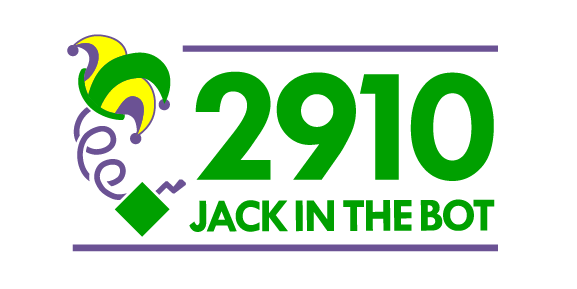2025: REEFSCAPE
Awards: Autonomous Award (Sammamish, Auburn, PNW District Championship); Innovation in Control Award sponsored by nVent (Newton Division)
The 2025 FRC game, REEFSCAPE℠ presented by Haas, immerses teams in an ocean restoration theme, where robots collect and place PVC Coral on Reef structures of varying heights. Teams also handle large green Algae game pieces, which can be “Processed” at a ground level port or scored on a central field-spanning Barge for additional points. The match begins with the typical 15-second autonomous period, followed by teleop, and concludes with an endgame where robots climb Cages attached to the Barge—scoring based on whether they chose a shallow- or deep-hanging Cage. A Coopertition® bonus can be earned if both alliances “Process” at least two Algae, encouraging strategic inter-alliance collaboration.
Fans of our 2023 robot, Phantom, will recognize the architecture that inspired this year’s robot, Spectre. With a similar arm, an end-effector designed to manipulate and score Coral and Algae with both Reef and ground pick up, and a blazing-fast Deep Cage climb, Spectre made a strong impression on the REEFSCAPE field from the start.
Spectre debuted at the week 2 PNW District Sammamish event. With an SDS MK4i swerve drive train and experienced drive team, we dove right in to place in the #1 seed, captaining the alliance to take the win with an impressive event record of 16-1-0.
At our next event, week 4 at PNW District Auburn, a modified intake and additional time at the North End Practice Field (thank you, Edmonds School District, and teams 1778 and 2522), gave us a bit more edge. We rode the tide of success to the #1 seed position and captained that alliance to finish that event unbeaten and earn a second blue banner for the season.
The PNW District Championship is always very competitive with the top 50 teams in Washington and Oregon vying for the title — and 2025 did not disappoint. 2910 dropped two qualification matches to arrive at alliance selections in the #3 spot (10-2-0). We captained that alliance, sailing through the upper playoff bracket then cleanly sweeping the best 2-of-3 finals matches, taking home our third blue banner. This event clinched our spot at the World Championship, where we were assigned to the Newton Division.
The 75-team Newton Division at FRC World Championship was stacked with a slate of impressive robots. A last set of modifications to Spectre’s end-effector and an upgrade to the newly released SDS MK5 swerve modules served us well as we splashed through quals with a record of 8-2-0, putting up a couple of world record scores in the process. Ending quals in the #2 spot, we were selected by the #1 seed, 1323 Madtown Robotics, as their first pick, adding 4272 and 5026 to complete the alliance. A spotless playoff and finals run earned us a Newton Division winner’s banner and a trip to Einstein playoffs for the third time in 2910 team history.
As the Newton Division winners, we were pitted against the seven other division winners to chase the Einstein field win. Einstein playoffs were incredibly exciting and the Newton alliance stood strong in the double-elimination upper bracket until a loss in match 11 forced an additional play in match 13. We persevered against the Daly alliance to grab our spot as an Einstein finalist for the first time since 2018.
Facing off against the powerful Johnson alliance, with last year’s FRC Champion team 1690 at the helm, 2910 pushed harder than we ever have before. Victory was close and we could taste it! After an unfortunate loss in the first match, Newton alliance surged back in match 2, forcing a tiebreaker. In the stands, the team loudly counted every Coral piece placed in the flawless auto, cheered for every Algae scored in the Barge, and erupted when 2910 stole a key Algae to deprive the Johnson alliance of critical points. A Reef bursting with Coral and a perfectly executed Deep Cage triple climb sealed the deal for the Newton alliance and, after a nail-biting wait for the official results, the stands erupted in a tidal wave of cheering as the Newton team was crowned the 2025 FRC Championship winners!
2910 has been chasing this title since we were unexpected Einstein finalists in 2018 with Kayla. While it takes a huge amount of planning, skill, and dedication to become a World Champion, it also takes a certain amount of luck. We are grateful that our hard work and drive allowed us to grab that luck when it was offered to take us to this much sought-after win.
We are grateful to everyone who has been a part of our journey including:
- Our current and former students, mentors, and coaches
- Our PNW District and Newton Division partners and competitors
- FIRST Washington and all the amazing FIRST volunteers
- Our sponsors, Boosters, and families
- And our founder and coach emeritus, Maggie Thorliefson
A piece of this belongs to each and every one of you. Thank you!

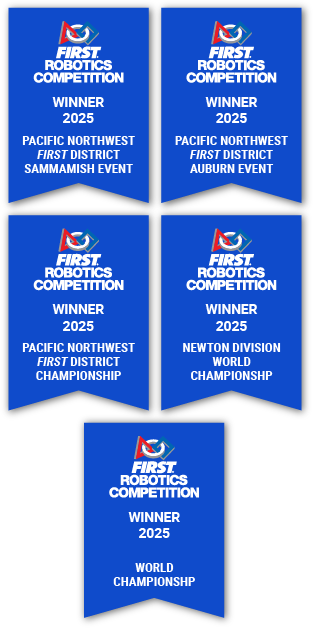
2024: CRESCENDO
Awards: Quality Award (Glacier Peak); Innovation in Control Award (PNW District Championship, Newton Division at World Championship)
The 2024 season broadens our horizons to include Art in the STEAM themed game year (Science, Technology, Engineering, Art, Math). The game was based around concert stage performance theme, with robots scoring torus (ring-shaped) foam Notes into either a Speaker or Amp, then finishing the end game by pulling up onto the chain-based Stage. Scoring a minimum number of Notes per alliance earned a Melody ranking award, and a minimum number of points in the end game Stage area earned the Harmony ranking point.
This year’s robot, Typhoon, was the first the team had ever built with a turret shooter mechanism. The under-bumper intake fed the pliable Notes up through our “slurp” mechanism into the shooter at any angle, allowing the robot to intake and shoot Notes into the Speaker without having to realign the turret and drive base to a pre-set position. With the addition of a bar and arm mechanism, we could also score Notes into the Amp, and a pair of climbing hooks deployed in the end game to allow for a Stage climb either centered or with another robot for a Harmony climb.
We debuted Typhoon in its first iteration with the turret shooter mechanism at Glacier Peak where we triumphed as the number 1 seed captain and eventual event winner with a record of 16-3-0 for the event. We ranked first and captained the first alliance, eventually winning the event as well as being recognized with the Quality Award.
Typhoon increased in strength to Cat. 2 for the Bonney Lake event with a re-designed shooter and the addition of the bar and arm mechanism for Amp scoring. Our improvements helped the team to end qualifications in the number 4 spot, and but were able to bring home the season’s second blue banner as the first pick of alliance one, ending the day with a record of 14-2-1.
PNW District Champs was hit with Typhoon Cat. 3, now featuring a Stage climbing mechanism. We ended the quals ranked 12th and were selected as the first pick of the number 1 alliance again. Typhoon blew hard through the elimination rounds until dying back in round 3 of the elimination bracket, for a final event record of 10-5-0. We did not come home empty handed though, as the judges recognized us with an Innovation in Control Award. With this particular honor, Team 2910 completed the FIRST Engineering Award hexfecta — having received each of the six judged engineering awards offered at FIRST events at least one time.
Typhoon Cat. 4 made landfall in the Newton division at the World Championship in Houston. We had high hopes for our chances, having iterated and improved the robot between every event. Whirling through the exciting and stiff competition, we ended quals ranked 21 and were selected to join the number 2 seed alliance for the eliminations rounds, making it all the way to the end only to be eliminated in the best 2 out of 3 for the Newton division. Being a finalist team at World Championship still comes with a great trophy, and we also received the recognition of the Innovation in Control Award for this prestigious competition, edging out 74 other robots for the honor.
Off-season saw us back at the elite Indiana Robotics Invitational (IRI) event in July, where we seeded 1 and brought home the slightly corn-scented IRI banner for the second year in a row.
In September, we headed to San Jose for the lauded “Best in the West” event, Chezy Champs. After three years as finalists at this incredible off-season tournament, we finally clinched the elusive W! That win made us the first team ever to take both IRI and Chezy Champs in the same year.
This has been a year full of amazing firsts for this FRC team, and we are always humbled and grateful for the support of our district, school, sponsors, and families. Onward to REEFSCAPE in 2025!

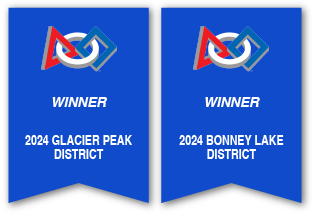
2023: CHARGED UP!
Awards: Excellence in Engineering Award (Glacier Peak); Industrial Design Awards sponsored by General Motors (SunDome, PNW District Championship); Autonomous Award sponsored by Ford (Sammamish)
The 2023 season encouraged us to look at energy use and sustainable development with the Charged Up game. This year, the field featured a Grid for scoring game pieces. Robots could pick up Cubes and Cones to score them in the appropriate Nodes. During the first fifteen seconds of every match, robots would do this autonomously. To score additional points at the end of the game, robots climbed and balanced on moving “Charge Stations.”
We built two identical robots this season, called Phantom and Loki. They were equipped with Swerve Drive Specialties MK4i swerve modules, powered by Falcon 500 motors, as well as three dead-axle rollers to allow the intake of both Cubes and Cones.
As always, we debuted our robot at Glacier Peak where we started off strong with zero losses during the whole event. We ranked first and captained the first alliance, winning the event. We also earned the Excellence in Engineering Award.
Then we moved on to SunDome, where after many exciting matches we ranked first again and won as captains of the first alliance, additionally taking home the Industrial Design Award.
At Sammamish, we again ranked first and won the event, earning yet another award–the Autonomous Award.
At District Championships, just like all the events before, we won the event as the first seated alliance, winning a second Industrial Design Award.
On the Galileo Field at the World Championship, we competed against seventy-six other teams and ranked fifty-first. We were the first pick of the third alliance and won our first semifinal match, though we unfortunately struck out later on and were eliminated after Semifinal Match 10.
Overall, we had such a great season and we’re proud of everything we accomplished. Our blue banners hang proudly in our school and we’re excited to add to the collection in 2024!
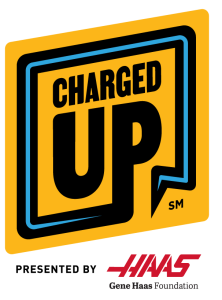
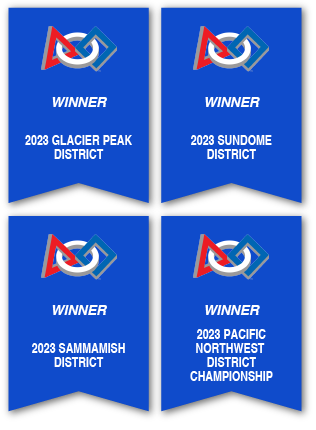
2022: RAPID REACT
Awards: Autonomous Award sponsored by Ford (Glacier Peak, Bonney Lake)
In 2022, we took a trip into the world of transportation with the Rapid React game. This game involves two alliances, each comprising three teams. Each team operates a robot, undertaking specific tasks to accumulate points. The focal point of the game is for both alliances to launch inflatable balls, referred to as Cargo, into a central Hub. To introduce Cargo throughout the match, human players operated Terminals on either end of the field. Additionally, teams aim to ascend within their Hangars as the match concludes. The primary goal in every match is to outscore the opposing alliance before the match concludes.
Team 2910’s robot this year was called Thor, in honor of a recently retired coach, Ms. Thorleifson. Thor was equipped with our signature Swerve Drive Specialties MK4i swerve modules and a speedy mecanum wheel intake for easy Cargo pickup. Our drivetrain was powered by Falcon 500 motors and Thor was equipped with a hood that could both aim and shoot Cargo and climb the Hangars.
Debuting our robot at Glacier Peak, we started the season strong by captaining the first alliance and winning the event. We also earned the Autonomous Award.
Our second event, SunDome, was a similar story. We once again captained the first alliance and won the event, though this time with a perfect record of 12-0-0 in qualification matches and 6-0-0 in playoff matches.
Then at Bonney Lake, we ranked second but secured the win as the first pick of alliance one. We also earned an additional autonomous award.
At District Championships, we ranked first of fifty teams and captained the first alliance yet again, ultimately winning the event and securing our spot at the World Championship.
At Worlds, we ranked third of the seventy-six teams in the Newton division and, captaining the third alliance, won our division. On the Einstein Field, we won three matches before we were eliminated in Semifinal Match 15 with our alliance placing third overall in this international competition.
It was a hugely successful season overall and we’re so happy to call ourselves World Division winners. Thanks for joining us in Rapid React!

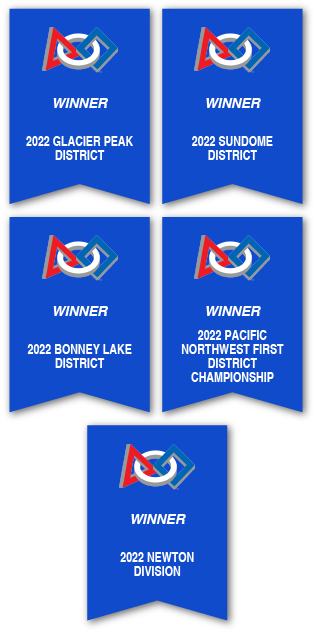
2021: INFINITE RECHARGE At Home
Awards: Engineering Design Award — Game Challenge, Phosphorus Group
Getting deja vu? Due to COVID-19 complications and restrictions, the 2021 game presents a remote format in which students can participate in robotics challenges while staying safe and socially distanced. Infinite Recharge At Home (2021) is a reboot of the previous season’s game with a virtual twist. With no events scheduled, this season was a unique challenge.
The rules were fundamentally the same as the 2020 season with some minor changes to adapt to the new virtual environment. Teams were tasked with completing “skills challenges,” such as the Power Port Challenge (in which students used their robot to pick up and score power cells) or the AutoNav Challenge (in which students programmed the robot to autonomously navigate three predetermined paths in as little time as possible).
In addition, each team was tasked with a Game Design Challenge and an Innovation Challenge. The Game Design Challenge asked teams to come up with hypothetical FRC game ideas that could potentially be made into official season games. Specials rewards were created for this challenge, including the Designer’s Award, the Concept Award, the Imagery Award, the Creativity Award, the Engineering Design Award, and/or the Rookie Design Award. The Innovation Challenge tasked students with solving problems related to the Game Changers theme. Teams presented their solutions to a panel of judges in a business-pitch style, and judges’ evaluations could determine whether the team moved on to the next stage of the challenge.
This year, Team 2910 made a miniature version of our 2020 robot, dubbed Baby Grond. We participated in all of the virtual games and had a ton of fun navigating this unexpected challenge.
After competing in the Infinite Recharge At Home Challenge, we took home a blue banner for Rhodium Group.
Later, participating in Phosphorus Group during the Game Design Challenge, we won the Engineering Design Award .
And during the 2021 off-season, once we were allowed to compete in person, we had a great time at Bordie Recharge, where we took home the win, and were thrilled to be a finalist at Chezy Champs, where we also won a Quality Award.

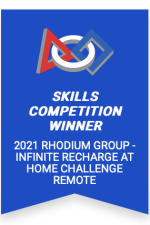
2020: INFINITE RECHARGE
Awards: Autonomous Award sponsored by Ford (Glacier Peak, West Valley)
This 2020 season, the game is INFINITE RECHARGE and the goal is to protect FIRST City from an incoming asteroid shower by powering up their Shield Generator. Starting with two alliances with three robots each on opposite sides of the field, robots are pre-loaded with up to three Power Cells, the game piece used to score points during the match. Similar to previous years, during the first 15 seconds of the match the robots move autonomously. Robots can score during this period in any of the three Power Ports. After the 15 seconds are up, drivers regain control over their robots as they try to score as many Power Cells as possible. Robots can obtain more Power Cells from any of the five chutes in their loading bay. Another method of scoring is via the Control Panel. After scoring a required number of Power Cells, robots will either rotate the Control Panel a specified amount of times, or position it to a specific color. At the end of the match, robots race to their Rendezvous Point to climb for extra points in order to make their Shield Generator operational and protect FIRST City!
Our 2020 robot, Grond, features the Swerve Drive Specialities MK2 modules powered by Falcon motors. Again, going for simple and competitive, our robot debuted with a 7-power cell autonomous and climb capability. Later in the season we deployed a control panel feature to allow us to manipulate that game element.
At our debut event in Glacier Peak, Grond and our drive team performed well, placing first overall and captaining the number 1 seed alliance to a blue banner win.
In our second event at West Valley, we ended qualifications in second place, and were selected by the first place team to join the number 1 seed alliance, again earning the blue banner.
Unfortunately, due to the rapid spread of the COVID-19 illness cause by novel Coronavirus, the FIRST organization suspended the FRC regular season worldwide during week 3. We feel incredibly grateful to have played two events when many teams around the world were not able to go to even one competition. As of this writing (March 14, 2020) we hope that our PNW season may resume in the fall of 2020, but that has yet to be determined.

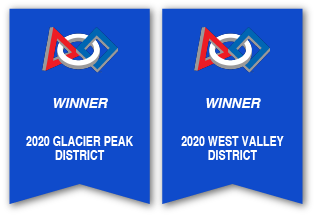
2019: Destination: Deep Space
Awards: Autonomous Award sponsored by Ford (Mount Vernon); Excellence in Engineering Award sponsored by Delphi (SunDome); three Quality Awards sponsored by Motorola Solutions Foundation (Glacier Peak, PNW FIRST District Championship, Carver-Newton Division at Houston World Championship); PNW District Event Winner at Mount Vernon, SunDome, and Glacier Peak and PNW FIRST District Championship Winner.
The Destination: Deep Space game celebrates the 50th anniversary of the moon landing while looking forward to the future of human space exploration. On Planet Primus, the robots start from the safety of the tri-level HAB (habitat). The mission begins during the Sandstorm period, when driver vision is blocked. Robots advance off of the HAB, gaining additional points for higher level starts, and moving either under autonomous control or with driver vision assistance. After 15 seconds, the Tele-Op period begins and robots race to manipulate Hatches to close cargo bays on the Rockets and Cargo Ship which they then fill with Cargo Pods. At the end of the match, robots return to the HAB, gaining extra points for climbing the various levels, ready to lift off with the mission accomplished.
Our 2019 robot, Jordan, featured the next generation of swerve drive, the MK2. We engineered her from the beginning to be a simple, competitive robot, and consciously chose to play the low game only. In sandstorm we left HAB 2 and placed two hatch panels using semi-automous programming. During tele-op, we took advantage of the fast cycle times with the swerve drive to rack up points with game piece scoring, and reliably and quickly ended the match by returning to HAB 3. We were even able to share that HAB with other robots under the right circumstances.
This design and our performance earned us our 4 blue winner’s banners in all three district events and at PNW Championships. We were consistently ranked in the top 10, or even top 5, by OPR or by Elo (as derived by Caleb Sykes). We were riding high as we entered the Newton Division at World Championships.
Worlds was a crazy ride, as always, and we made it all the way to the quarter-finals when our time ran out. However, we did not come home empty handed, earning a Quality Award for Carver-Newton — our first adjudicated award from World Championships.
We can only hope that our next season is anything like as successful for us as Destination: Deep Space was!

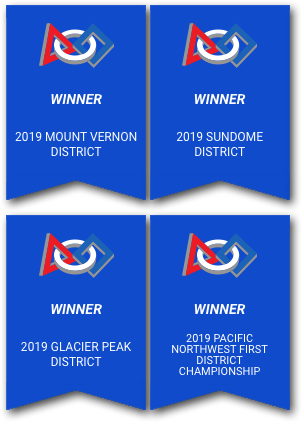
2018: Power Up
Awards: Three Excellence in Engineering Awards sponsored by Delphi (district and PNW regional); PNW District Winner at Mount Vernon and Glacier Peak; Houston Championship Carver Subdivision Winner; Houston Championship Einstein Finalist
The 2018 Power Up game was inspired by classic console video games from the arcade era. Trapped in a arcade game, alliances must work together to “Defeat the Boss” and escape the field. Robots manipulated Power Cubes to place them on either a tall scale or floor switches, gaining ownership and earning points. The robots could also deliver Power Cubes to human players at the Vault to earn valuable Force, Boost, and Levitate Power Ups. Finally, the robots had to Climb the Scale in order to Face the Boss!
Our 2018 robot, Kayla, was built with an innovative swerve drive, allowing for maximum maneuverability and speed around the obstacles of the play field. This amazing technology, plus an outstanding drive team, lead us to the Houston World Championships for a second time, where we went on to win the Carver Subdivision with our amazing alliance partners, teams 4911, CyberKnights, 4499, The Highlanders, and 5006, Apophis. The alliance stayed strong through Einstein Round-Robin play, and we held our breath as we moved closer and closer to the finals on Einstein Field. Under the Minute Maid Field Jumbo-Tron, we faced off on Einstein Field for the final championship match. Innovative technology, a skilled drive team, and a little bit of luck took us to the top in 2018. We walked away proud finalists, grateful for this amazing experience, and motivated to make it to Houston again next year.
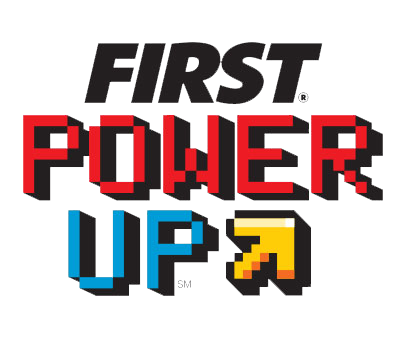
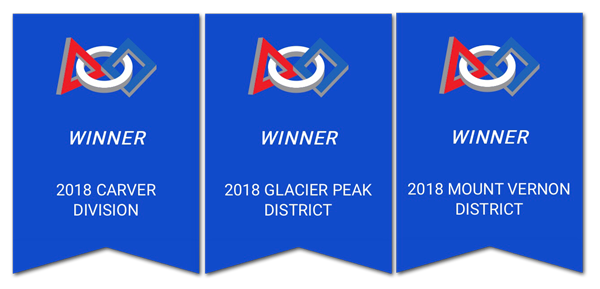
2017: Steamworks
Awards: Creativity Award sponsored by Xerox, Gracious Professionalism Award (At district level and regional level), Hopper Division Semi Finalist
One of the most exciting games yet! Drawing heavily from the steampunk subculture, 2017’s game Steamworks has teams competing to be the first to take off in an airship carrying human “pilots.” Robots compete to score modified Wiffle balls as fuel, and to bring plastic gears to the human players so that they may complete their airship.
This year was the first time our team has ever qualified for not only for District Championships, but also the World Championships, based solely on our robot’s performance. Our team made it all the way to semifinals in the Hopper Division at Houston, and we hope to push ourselves even farther in 2018.
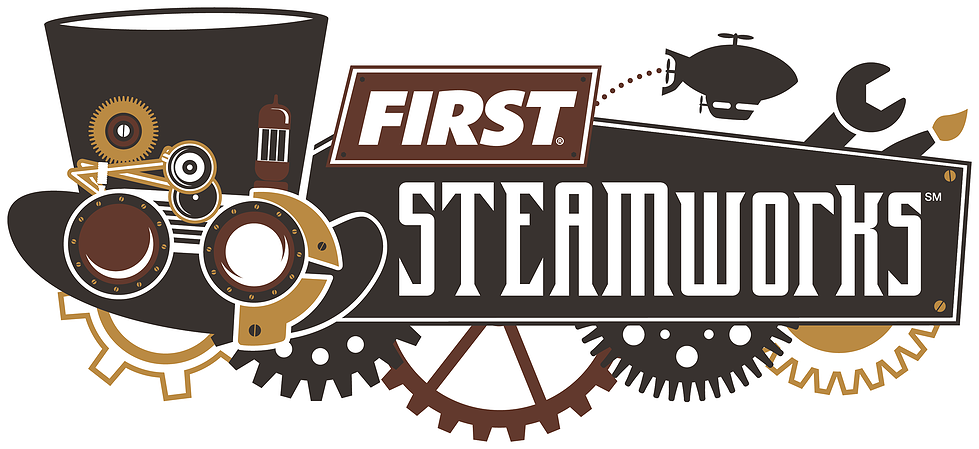
2016: Stronghold
Awards: District Championship Points Qualifying Team, Imagery Award in Honor of Jack Kamen, Team Spirit Award
Adopting the theme of “storming the castle” with the help of Disney Imagineering, 2016’s Stronghold was a very energetic game. Robots not only had to score “boulders” to weaken their opponents’ towers, but also be robust enough to cross over a variety of defenses.

2015: Recycle Rush
Awards: Imagery Award in Honor of Jack Kamen, Creativity Award Sponsored by Xerox
With the theme of recycling, the 2015 game Recycle Rush was the epitome of the FIRST philosophy of “Coopertition”. Rather than competing directly against the opposing alliance, robots cooperate with their alliance members to stack as many totes and cans as possible in their allotted time.
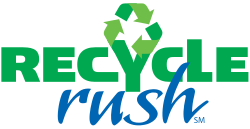
2014: Aerial Assist
Awards: Engineering Inspiration, Team Spirit Award
While not inspired by any real-world sport, the game for 2014, Aerial Assist, made for a very interesting and dynamic game.Like many other games, robots tried to score balls into goals on the opposite side of the field. However, unlike these other games, the points that robots got from were greatly boosted if other alliance members “assisted” the play. A truss in the middle of the field provided even more points if the balls were passed over it.
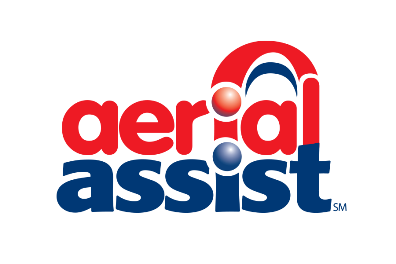
2013: Ultimate Ascent
Awards: Engineering Inspiration, Gracious Professionalism Award Sponsored by Johnson & Johnson
Styled after disc golf, 2013’s game Ultimate Ascent was played with frisbees. Robots scored by “throwing” frisbees into one of four goals on the opposite side of the field. At the end of the game, robots could score extra points by climbing onto a jungle-gym-like pyramid on either side of the field.
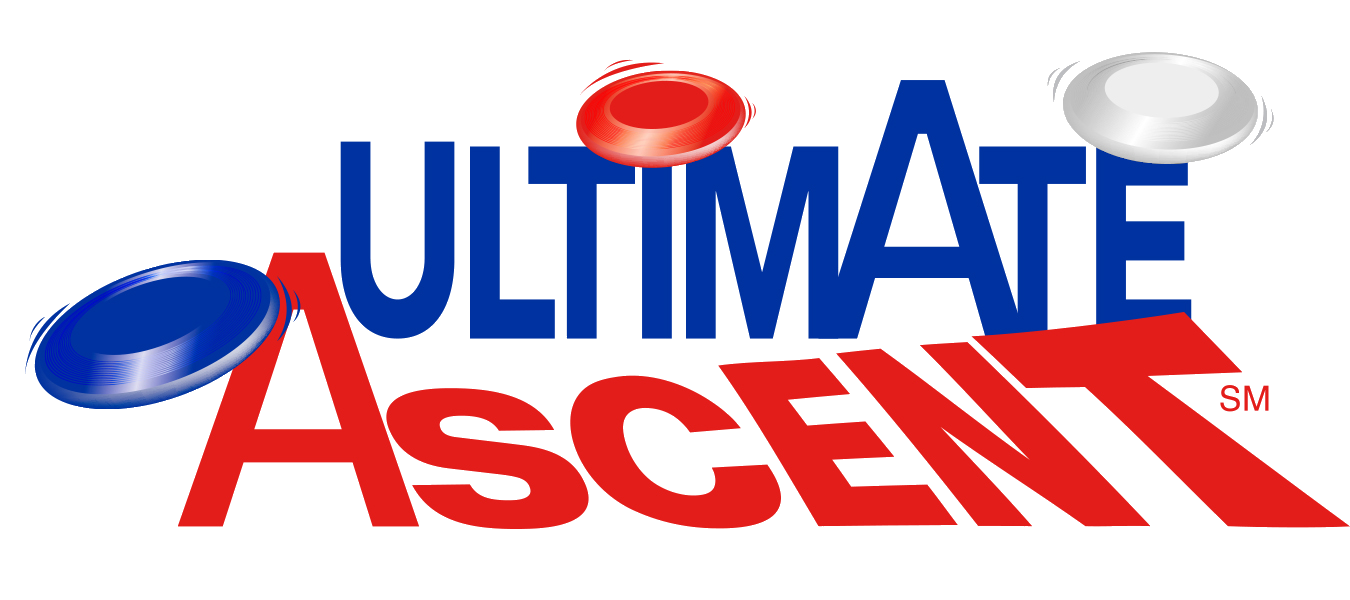
2012: Rebound Rumble
Awards: Team Spirit Award
Just as Breakaway was modeled after soccer, the 2012 game Rebound Rumble was modeled after basketball. Robots earned points by scoring as many foam basket balls into hoops of various heights, all while maneuvering across a field separated by a barrier with bridges.

2011: Logomotion
Awards: Team Spirit Award
The 2011 game, Logomotion, celebrated not only the 20th season of the FRC, but also the designer of the FIRST logo, Jack Kamen. In order to earn points, robots placed inflatable tubes onto racks to form the FIRST logo. Robots were also to deploy smaller “minibots” near the end of the match that would race to climb towers.

2010: Breakaway
Awards: Engineering Excellence Award Sponsored by Chief Delphi
Played on a field divided by bumps and tunnels, 2010’s game Breakaway was an interesting one indeed. Robots not only had to traverse the field’s uneven terrain, but also score soccer balls and climb onto field structures.

2009: Lunacy
Awards: Rookie All-Star Award
Honoring the 40th anniversary of the first manned mission to the moon, 2009’s FRC game Lunacy made for an unique and successful rookie year. With a special field material and mandated wheels to simulate the low traction on the moon, robots on each side tried to score as many game pieces as possible into the opposing alliance’s moving trailers.

